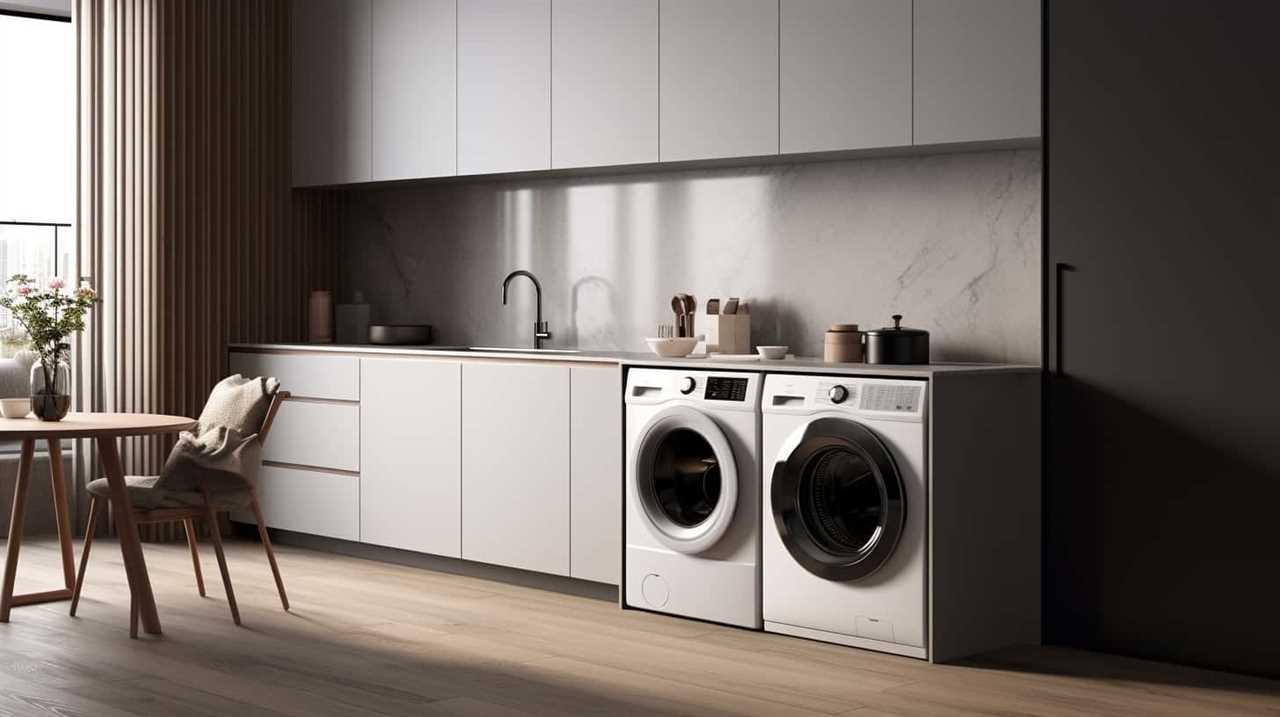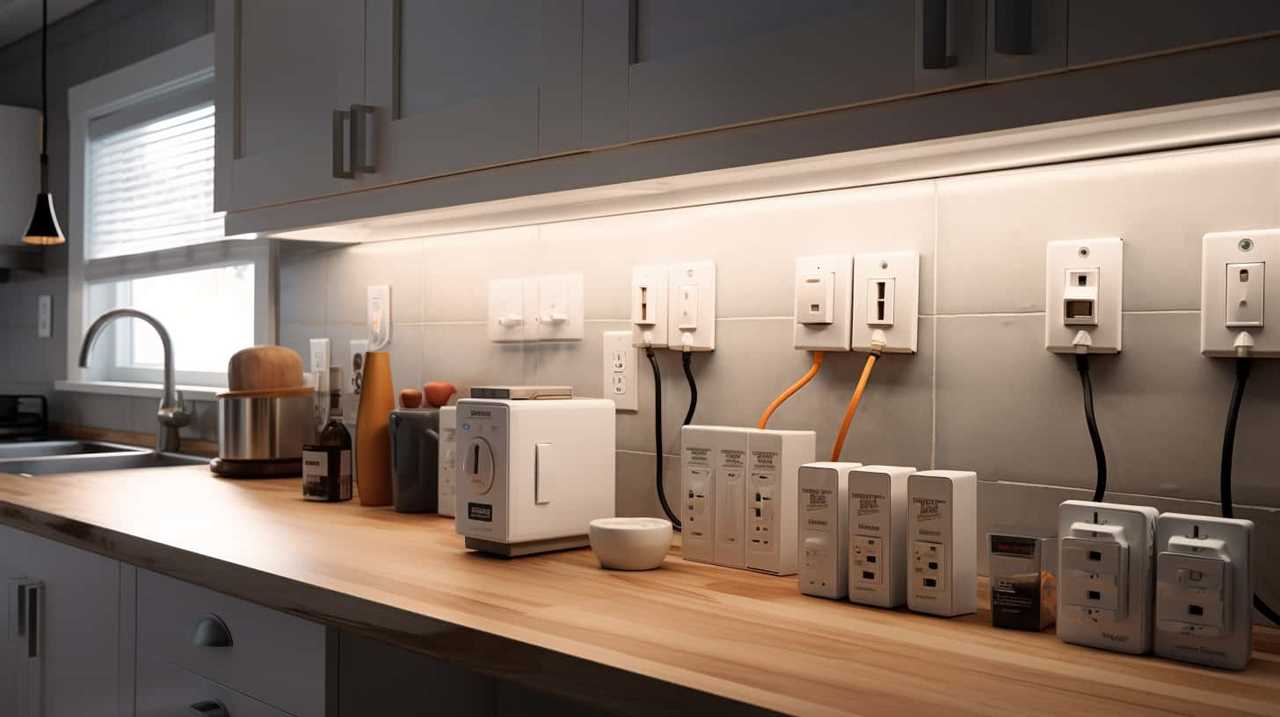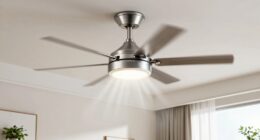Ever thought about which appliances need a 240-volt power supply? Don’t worry, we have the answers for you. This article will explore kitchen appliances, HVAC systems, electric water heaters, electric vehicles, power tools, and commercial equipment.
Get ready to discover the world of 240-volt appliances and how they can enhance your everyday life. From cooking to staying comfortable, we’ll explore the wide range of options available for those seeking electrical mastery.
Key Takeaways
- Electric ranges, wall ovens, and cooktops require 240 volts for optimal performance.
- HVAC systems require 240 volts for efficient operation.
- Electric water heaters require a 240-volt electrical supply for efficient operation.
- Electric vehicles heavily rely on a 240-volt electrical supply for charging.
Kitchen Appliances
We have several kitchen appliances that operate on 240 volts. These appliances have specific voltage requirements to function properly and efficiently.
When it comes to small appliances, such as blenders, toasters, and coffee makers, most of them are designed to operate on standard household voltage, which is 120 volts. However, there are certain energy-efficient kitchen appliances that require 240 volts to function optimally.

These appliances include electric ranges, wall ovens, and cooktops. The higher voltage allows these appliances to generate more power, resulting in faster cooking times and better performance.
It’s important to check the voltage requirements of these appliances before purchasing or installing them, as using the incorrect voltage can lead to damage or malfunction.
HVAC Systems
An HVAC system is a collection of appliances that require 240 volts to operate efficiently.
When it comes to HVAC system installation, there are a few important things to consider.

Firstly, proper sizing of the system is crucial to ensure optimal performance. Oversized systems can lead to temperature inconsistencies and increased energy consumption, while undersized systems may struggle to adequately heat or cool the space.
Secondly, regular maintenance is essential to prevent common HVAC problems such as dirty filters, refrigerant leaks, or faulty thermostats. Neglecting maintenance can result in reduced efficiency, poor indoor air quality, and even system breakdowns.
Lastly, it’s important to address any issues promptly to avoid further damage and costly repairs.
Now, let’s move on to the next section about electric water heaters.

Electric Water Heaters
Now let’s delve into the world of electric water heaters and explore their reliance on 240 volts for efficient operation.
Electric water heaters are crucial appliances for providing hot water in residential and commercial settings. To ensure proper functioning, electric water heaters require a 240-volt electrical supply. The installation of an electric water heater involves connecting it to a dedicated circuit that can handle the higher voltage. This ensures the heater can operate at its full capacity, providing hot water quickly and efficiently.
It’s important to note that the energy efficiency of electric water heaters can vary depending on factors such as insulation, thermostat settings, and maintenance. Regular maintenance and proper installation of electric water heaters are essential for optimal energy efficiency and performance.
Electric Vehicles
Let’s explore the reliance of electric vehicles on a 240-volt electrical supply. Electric vehicle charging is a crucial aspect of owning an electric vehicle, and it heavily relies on a 240-volt electrical supply. Here are three key points to consider:

- Faster charging: Electric vehicles can be charged using a standard 120-volt outlet, but this typically results in slow charging times. With a 240-volt supply, charging is significantly faster, allowing you to charge your vehicle more efficiently.
- Extended battery range: A 240-volt electrical supply enables electric vehicles to charge at a higher power level. This means that you can charge your vehicle to its maximum capacity, resulting in an extended battery range and more miles of driving per charge.
- Convenient home charging: Installing a 240-volt charging station at home provides convenience and flexibility. You can easily plug in your vehicle overnight and wake up to a fully charged battery, ready for your daily commute or any other journey.
Understanding the importance of a 240-volt electrical supply for electric vehicle charging is essential for maximizing the battery range and ensuring convenient charging options.
Power Tools
When it comes to power tools, understanding voltage requirements is crucial.
Some power tools, especially heavy-duty ones, may require a 240V power supply to operate efficiently.
This higher voltage option provides several advantages, including increased power and performance.

Voltage Requirements for Tools
We need to consider the voltage requirements for power tools. It’s crucial to ensure that power tools are operated within the appropriate voltage range to ensure voltage safety and electrical efficiency.
When it comes to voltage requirements for power tools, there are a few key factors to keep in mind:
- Voltage safety:
- Power tools should always be used with the correct voltage to prevent electrical hazards and ensure the safety of the user.
- It’s important to check the power tool’s voltage rating and use the appropriate power supply to avoid overloading or damaging the tool.
- Electrical efficiency:
- Power tools designed for higher voltage can often deliver more power and perform tasks more efficiently.
- Using power tools with the correct voltage rating will help optimize their performance and extend their lifespan.
240V Power Tool Options
Our preferred option for power tools is the 240-volt V power tool. These tools provide a higher voltage, allowing for increased power and efficiency compared to their lower voltage counterparts. One popular example of a 240-volt power tool is the cordless drill, which offers the convenience of portability without sacrificing power. Another commonly used 240-volt power tool is the impact driver. This tool is designed to deliver high torque and rotational force, making it ideal for tasks that require extra power, such as driving screws into tough materials. To help you understand the different options available, we have provided a table below that showcases some common 240-volt V power tools and their key features.
| Power Tool | Key Features |
|---|---|
| Cordless Drill | Portable, high power, long battery life |
| Impact Driver | High torque, rotational force, efficient |
Advantages of Higher Voltage
The enhanced performance and capabilities of power tools with higher voltage make them a preferred choice for professional users. Here are the benefits of higher voltage power tools:

- Increased power output: Higher voltage allows power tools to deliver more power, resulting in faster and more efficient operation. This is particularly useful when working on tough materials or large projects.
- Improved productivity: With higher voltage, power tools can perform tasks more quickly, reducing project time and increasing productivity. This is crucial for professionals who need to complete jobs efficiently.
- Longer runtime: Higher voltage power tools typically have larger batteries, which provide a longer runtime. This means less downtime for recharging, allowing professionals to work continuously for longer periods.
However, it’s important to consider safety considerations when using higher voltage power tools. These include:
- Proper training: Users should receive proper training on handling and operating higher voltage tools to ensure safe usage.
- Insulation and grounding: Power tools with higher voltage require proper insulation and grounding to prevent electrical hazards.
- Personal protective equipment: Professionals should always wear appropriate personal protective equipment, such as gloves and safety goggles, when using higher voltage power tools.
Commercial Equipment
While residential homes typically use 120 volt appliances, commercial equipment, on the other hand, often operates at 240 volts. This higher voltage is necessary for powering larger and more complex machinery found in commercial settings.
Commercial refrigeration units, such as walk-in coolers and freezers, require 240 volts to maintain the low temperatures necessary for preserving perishable goods. Industrial machinery, such as manufacturing equipment and large-scale generators, also rely on 240 volts to ensure efficient and powerful operation. The increased voltage allows for greater energy transfer, enabling these machines to perform their functions effectively.
Additionally, the use of 240 volts in commercial equipment reduces the risk of power overload and ensures the equipment can handle heavy-duty tasks. Therefore, commercial establishments require the higher voltage of 240 volts to accommodate the demands of their specialized equipment.

Frequently Asked Questions
Can I Use a 240-Volt Appliance With a Standard 120-Volt Electrical Outlet?
We can’t use a 240-volt appliance with a standard 120-volt electrical outlet. It’s unsafe and can cause damage. To use a 240-volt appliance, we need a dedicated 240-volt outlet and proper wiring.
Are There Any Safety Precautions I Should Take When Using 240-Volt Appliances?
When using 240-volt appliances, it’s important to take safety precautions. Ensure voltage compatibility, use proper wiring and outlets, and follow manufacturer instructions. Failure to do so can result in electrical hazards or damage to the appliance.
How Can I Determine if an Appliance Is 240 Volts or 120 Volts?
To determine the voltage requirement of an appliance, we can check the label or manual for specifications. If the appliance requires 240 volts, we may need to convert the voltage using a transformer or consult a professional electrician.
Can I Convert a 120-Volt Appliance to Operate on 240 Volts?
Yes, we can convert a 120-volt appliance to operate on 240 volts. However, it is crucial to consider the electrical compatibility and ensure proper conversion methods are followed to avoid damage or safety hazards.

Are There Any Energy-Saving Benefits to Using 240-Volt Appliances Over Their 120-Volt Counterparts?
There are energy efficiency and cost effectiveness benefits when using 240-volt appliances instead of their 120-volt counterparts. These appliances are designed to operate more efficiently and can help reduce energy costs in the long run.
Conclusion
In conclusion, a wide range of appliances operate on 240 volts, including kitchen appliances, HVAC systems, electric water heaters, electric vehicles, power tools, and commercial equipment.
These high-powered devices require the precision and efficiency that only a 240-volt electrical connection can provide.
So, whether you’re cooking up a storm or staying cool in the summer heat, rest assured that these appliances are designed to deliver the power you need.










